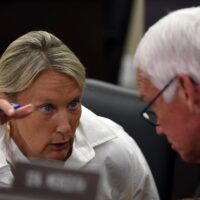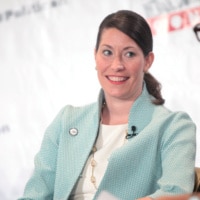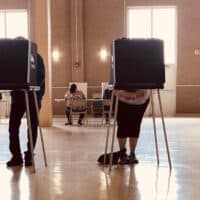LOUISVILLE, Ky. — Donation or transaction? The distinction makes a big difference when it comes to whether Kentucky churches must collect sales taxes.
The issue raced to the forefront this year when Rep. James Tipton, R-Taylorsville, filed HB 37, a bill that would exempt most non-profits, including churches, from having to collect the 6% sales tax on items such as meals and sports leagues.
But the fact that they are required to collect the sales tax came as a surprise to many pastors.
For clarification, Kentucky Today went to Rep. Jason Petrie, R-Elkton, the chairman of the House Appropriations and Revenue Committee.
Petrie said the requirement for churches to collect the sales tax on meals has been around since the 1960s when the tax was first implemented. But, Petrie said, the sales tax has never applied if the meal was offered for a suggested donation or used as a fundraiser.
“You can use an example of a Wednesday night supper or Sunday night, Sunday evening supper, if it’s a donation setup and you go ‘Five-dollar donation is accepted,’ there’s no tax context on that. If it’s, ‘We’re having a fundraiser on Wednesday night with a chili supper, again, no tax implication,” Petrie said.
“It’s only if, like any other commercial restaurant, you say, ‘Here’s the meal and here’s the charge for it’ — if you’re selling food, then there’s a tax.”
In 2022, the General Assembly did expand the sales tax to a greater number of services, including recreational activities and parking. Again, Petrie says, churches and other non-profits must collect the tax if they charge a fee for the service.
“Ministries on food or ministries on programs or books or study groups or even athletics, as long as it’s in the form of a donation context, there is absolutely no issue whatsoever. Or, if it’s in context of fundraising, even slightly, at least an attempt to fundraise, there’s nothing whatsoever,” said Petrie.
“It’s only when you get down to a straight transactional event like you would deal with in any other commercial entity, that’s when the tax even becomes an issue at all.”
Even if an event is considered transactional, Petrie said the sales tax collection applies to churches and non-profits only if the proceeds exceed $12,000 per year.
But, with so much confusion surrounding this issue, why not clear it up by exempting churches and other non-profits from the sales tax, as HB 37 attempts to do?
Petrie says he is concerned that the exemptions would raise legal issues of equal protection.
“Whenever we exempt that non-profit from a tax for which every other entity that competes in the same space, such as selling food or athletic competitions or whatever else, then we are definitely choosing winners and losers in giving non-profits the advantage and actually hurting the market for people that are trying to perform in the regular commercial world,” said Petrie.
But Bob Ehr, pastor of Lawrenceburg First Baptist Church, says having to collect sales tax would impact some of his church’s outreach ministries.
“The first thing that comes to my mind is our Upward Basketball ministry which reaches over 200 kids and their families. We reduce the cost as it is to keep it very affordable,” said Ehr. “Our church subsidizes the other expenses to make it affordable as an outreach to our community. This would just add more cost that we’re going to have to pay as a church for something that is a great ministry to our community.”
David Walls, executive director of the Family Foundation of Kentucky, said he is hearing the same thing from pastors across Kentucky.
“This could impact evangelistic efforts, impact community efforts that take place at the church. This is really an issue that needs to be addressed,” he said.
Walls said he would be happy with a bill that exempts only places of worship. But Petrie still raises the “equal protection” issue.
“Depending on what we exempt out, then we’re allowing an unfair competition with the rest of the world,” he said.
HB 37 has been assigned to Petrie’s committee, but he declined to say whether he would give it a hearing.
KBC Executive Director Todd Gray says this issue is causing real concern and confusion throughout the state and called on legislators to fix the problem.
“Having to be concerned with whether an event or activity requires collection of the sales tax puts another burden on our Kentucky Baptist pastors and churches who are simply trying to serve their communities. The meals served by the average church or the sports leagues they develop are at best breaking even and usually end up with the church offsetting the cost of the meal or activity from their budget,” Gray said.
“Most churches have a volunteer treasurer who has neither the time nor the resources to keep track of sales tax collection. I urge our lawmakers to make places of worship exempt from the sales tax, recognizing their unique role in our state. And I ask Kentucky Baptists to pray and to respectfully ask their state representative and senator to support freeing churches from the sales tax,” he said.
If you would like to call and leave a message for your legislator, you may call the Legislative Message Line at 1-800-372-7181 or you may contact your individual legislator.
Lawrence Smith is communications director for the Kentucky Baptist Convention. Her previously was a general assignment reporter for WDRB-TV in Louisville, where he won two Emmy Awards. He was a fixture on “Comment on Kentucky” on KET from 2014 to 2022, serving as a panelist and guest host.






